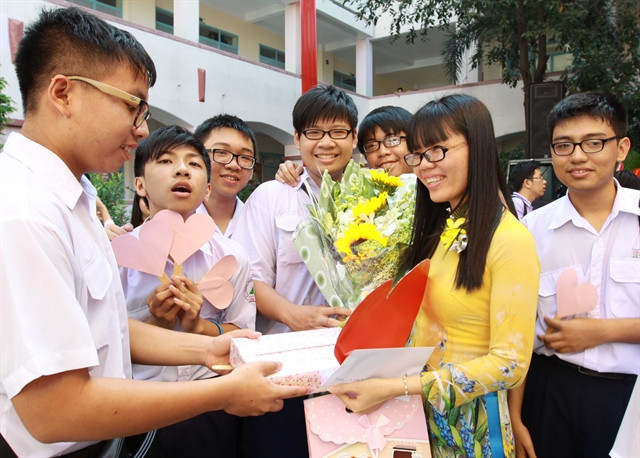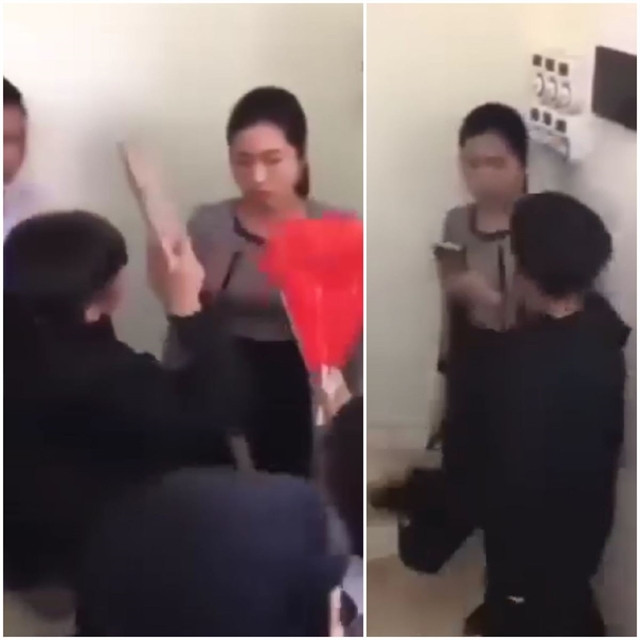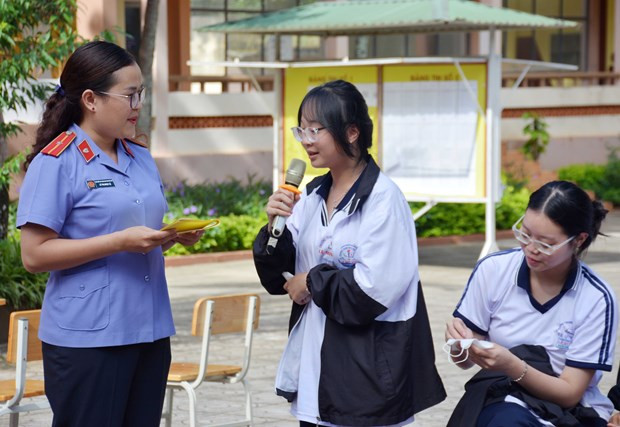 |
| Students present flowers and gifts for a teacher on Vietnamese Teachers' Day at Lương Thế Vinh High School in HCM City. VNA/VNS Photo Phương Vy |
Many serious cases of school violence have occurred in recent times, with the severity escalating as students display disrespectful behaviour towards their teachers.
This has raised a strong alarm about the importance of educating children on respecting teachers and upholding morality, along with implementing measures to protect educators.
In the past few days, public opinion has been stirred up by video clips showing a group of students at Văn Phú Secondary School in Sơn Dương District in the northern province of Tuyên Quang locking the door, cornering a female teacher, using vulgar language and insulting her.
The climax was reached when they threw shoes at her, causing the teacher to faint.
It is worth noting that this was not the first such incident. In May 2023, a teacher at Lê Duẩn High School in the central highland province of Đắk Nông was physically attacked by parents of students at her home because she had given their child a low grade on moral score.
In October 2022, social media was abuzz with a video clip of a 12th-grade female student at Nguyễn Chí Thanh High School in the southern central province of Khánh Hoà using vulgar language with a male teacher.
Also in October 2022, in the central province of Hà Tĩnh, a parent stormed into Sơn Lâm Elementary School, threatening to assault officials and teachers, and forcing the principal to kneel and apologise because of dissatisfaction with the announcement of his children's names in front of the entire school for not paying insurance fees.
In February 2018, under pressure from parents, a teacher was forced to kneel and express remorse for making students kneel when they made mistakes.
Incidents of school violence are on the rise. Alarmingly, the targets and boundaries of school violence are no longer limited when even teachers are victims of school violence, with the perpetrators being the students they are imparting knowledge to and educating.
 |
| An image extracting from the video clip showing students insulting their teacher at Văn Phú Secondary School in Sơn Dương District in the northern province of Tuyên Quang. |
Dr Trần Thành Nam, Vice Rector of the University of Education under Vietnam National University, Hanoi, said he was shocked when watching the widely shared video clips on social media.
"I believe that anyone working in the field of education witnessing these video clips would feel shocked. In the 'sanctuary of education,' where values such as love, sharing, cooperation, and respect are highly regarded by teachers, incidents contrary to these values are emerging,” he said.
“It is noteworthy that these inappropriate behaviours were not carried out by individual students but rather collectively by a class towards their teachers. This has raised concerns about the moral education and the imparting of values to the young generation," he shared.
Trần Thanh Thuỷ, a teacher with over 10 years of experience in Hà Nội, said every teacher has to deal with various pedagogical situations.
In some situations, teachers may behave in ways that are not up to standard due to lack of experience. In such times, teachers need to apologise to students as a way of setting a good example for them.
Expressing a clear stance on the issue, Dr Khuất Thu Hồng, Director of the Institute of Social Development Studies, stated that regardless of the teacher's actions, students were not permitted to exhibit such attitudes and behaviours.
“Over a dozen students surrounding, insulting and assaulting the teacher are unacceptable. There is clearly an issue with the students' morality here," she stressed.
According to Hồng, students don't naturally become spoiled, and the root cause lies in family education, school education and societal ethical issues that lead children to develop distorted thoughts, considering corruption or violence as normal and nothing to be feared.
Adults serve as a mirror for the younger generation. Instead of thinking and seeking peaceful resolutions and emotional connections, adults tend to resort to violence. Arguing at home, arguing in the streets, arguing in the market, and resorting to violence with the slightest provocation, will make children absorb and imitate these behaviours, she said.
Hồng emphasised that adults should reflect on themselves before blaming the younger generation when watching such clips.
On the other hand, schools focus on cramming scientific knowledge but often neglect to equip students with life skills, including conflict solution and negotiation skills. When conflicts arise, there is a lack of emphasis on teaching students how to avoid resorting to violence, she added.
Sharing the same viewpoint, Dr Nam, Vice Rector of the University of Education, said that the school cannot be entirely blamed for students’ disrespectful behaviours towards teachers.
"Where is the role of the family? If family education fulfils its duty well, the children themselves will have principles, behaviours and limits that ensure politeness, respect towards adults, especially their teachers,” he said.
Nam added that currently, children are living in environments filled with negativity. Conflicts and disputes make the younger generation gradually accustomed to the negativity, even immersing themselves in such an environment unknowingly. Over time, this strongly influences the worldview and values of these young individuals.
Young people nowadays are exposed toxic content on the internet that may contain inappropriate violent materials for their age.
"If we do not all join hands to educate the principles, standards and values for students, these phenomena will continue to occur, causing heartache for parents and teachers, and confusion in the community," he said.
 |
|
Students express their opinions about school violence prevention at Lê Quý Đôn High School in Buôn Ma Thuột City in the central highland province of Đắk Lắk. VNA/VNS Photo Hoài Thu |
In proposing solutions, Nam stated that the education system in the process of building a happy education environment, and some measures need to be applied immediately.
Both teachers and students need psychological counselling and support. Whenever teachers face crises or challenging pedagogical situations, they need assistance from the school's psychological counselling department.
In addition, school violence preventive programmes need to be reactivated. It is essential to clarify how behaviours of school violence occur to help students express appropriate attitudes towards such behaviours.
Students also need to be educated on living and interacting safely on social media to avoid putting themselves in risky situations.
Above all, teachers and parents must share positive discipline principles, applying them appropriately in situations at home and at school to teach students how to handle problems without resorting to violence, he said. — VNS